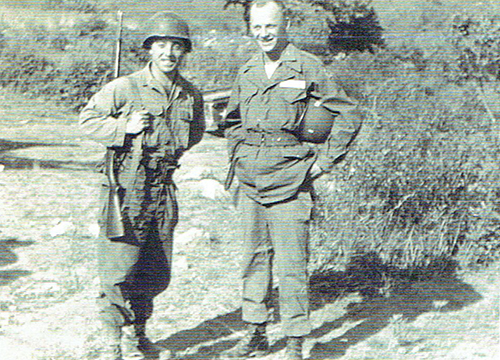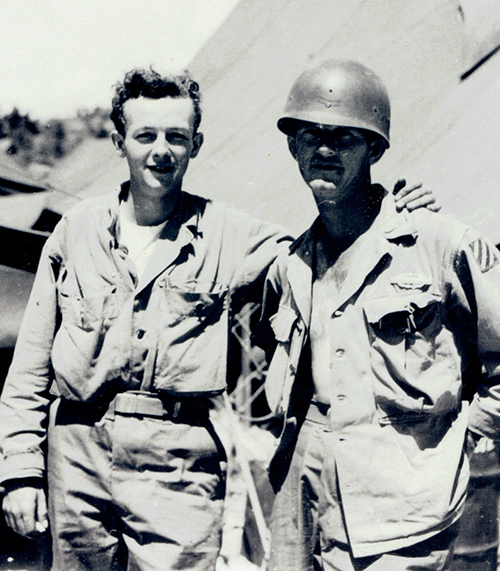
During a reading of Cold Ground’s Been My Bed in Manhattan, an active question and answer period followed. A senior stood up and asked, “What are you talking about? I was in the infantry in WWII and I never heard of it. What is a bunker bomb?”
Not many people knew of its existence I explained, and then went home to write this short memoir.
Korea 1952
What Is a Bunker Bomb?
I thought that blending in with my environment was an exercise in futility, but after a sniper killed Harry Lapich and Sgt. Fostine Rutledge outside their bunker in Korea, my attempt at concealment became serious. While sitting on my helmet in a trench outside my bunker, I rocked back to the damp wall, and mulled over some moments of my life.
Did you ever see a lassie A lassie, a lassie Did you ever see a lassie Go this way and that?
My first grade class was singing this ditty in P.S. 61’s schoolyard, while we formed a circle around our classmate who was merrily gyrating at its center. In third grade I graduated to an inkwell in my desk, a dip-in ink pen along with a chamois pen wiper. With all the multiplication tables mastered in fourth grade, I went on to division. Math reading problems in fifth grade were a bit of a challenge. Finally, in sixth grade, after the Japanese bombed Pearl Harbor, my classmate Donny and I were given permission to come to school later in the afternoon. We went to buildings in the neighborhood to collect newspapers and magazines for the war effort.
Hermann Ridder J.H.S. was three years of mischievous fun, while at James Monroe High School, in spite of being a miniature mesomorph, my maximum academic effort was getting in shape for the varsity football team. As the hours passed in the trench, I saw the rest of my life filtering through a gauzelike haze; a busboy in the Catskills, the Garment District, the New York Central Railroad, and then the military.
I knew there was a right way, a wrong way and the army way. Soon after a sniper killed Sgt. Rutledge, Lt. Theiss, my platoon leader singled me out to carry a bunker bomb in order to wipe out the suspected sniper’s nest. His bunker was at the bottom of a cliff, overlooking the Imjin River. I was certain this army way was the wrong way. From our side of the river, we could have blasted the bunker with a recoilless rifle or a .50 caliber machine gun, but the army way was to carry out this risky mission with a bunker bomb. Why was I selected to carry the bomb? I was the runner for the platoon. A A runner was not needed for this mission.
Charley came by to ask if I had a C-ration can opener.
“What are the chances that we will destroy that bunker, Charley?”
“I don’t give a shit about chances. I take them,” he replied.
I should have expected that from Charley.
“We never used a bunker bomb. What is this all about?”
“Take your ass over to Massey (our armorer), he’ll show you.”
It was a .30 caliber machine gun canister partially filled with napalm. Attached to it was a white phosphorus grenade. A four-foot pole was firmly connected to the canister.
I was to activate the white phosphorus grenade then quickly cram the bomb into the sniper’s bunker where the napalm would be detonated.
In the evening, our platoon went to the rear to act out the mission. Sgt. Flaherty, John Hollier, Oscar Konnerth, and Truman Bastin were wounded on previous missions. Our replacements proved dependable on patrols, but this was not a patrol, we knew our endpoint. I was to eliminate a bunker, an extremely hazardous plan.
I was convinced that in three days I would be on a casualty list doing it the army way. Would my sweet little father be able to console my mother when they get the news? Will they be able to bear the tragedy? How will they go on? Will aunts Fanny and Rosie help?
At twenty-two there weren’t many notable highlights in my life. My girlfriend, Elaine wrote regularly and sent pictures, but there was a seat at the back of the room for her, and another seat further back for my maturity.
Four of my buddies were being treated at a MASH, or at a clearing company hospital. So, here I was sitting in a trench trying to review my life as the day of the mission drew near.
After an anxious night, D-day arrived. Our men were on edge. Silence became the conversation for the afternoon. Finally, daylight crept into dusk. Our squad went to Massey to get the ordnance they needed. I collected the bunker bomb then, led by Lt. Theiss, I followed my squad down the Free-Lane and into the river.

The rest of this story can be found in Cold Ground’s Been My Bed:A Korean War Memoir in the chapter, Baptism and Resurrection. danielwolfebooks@aol.com